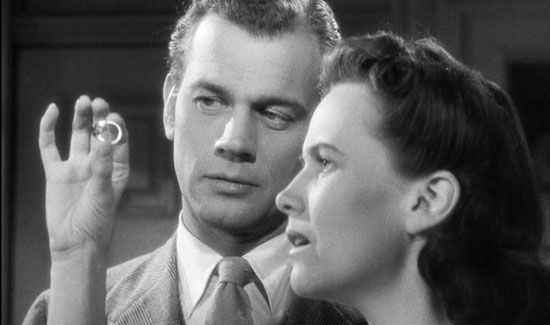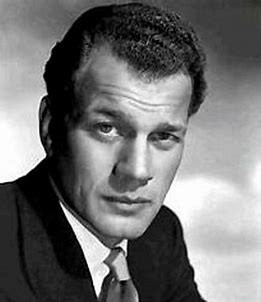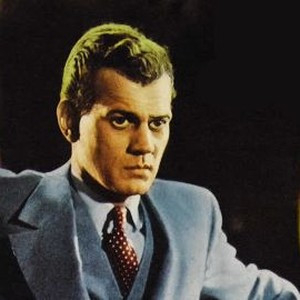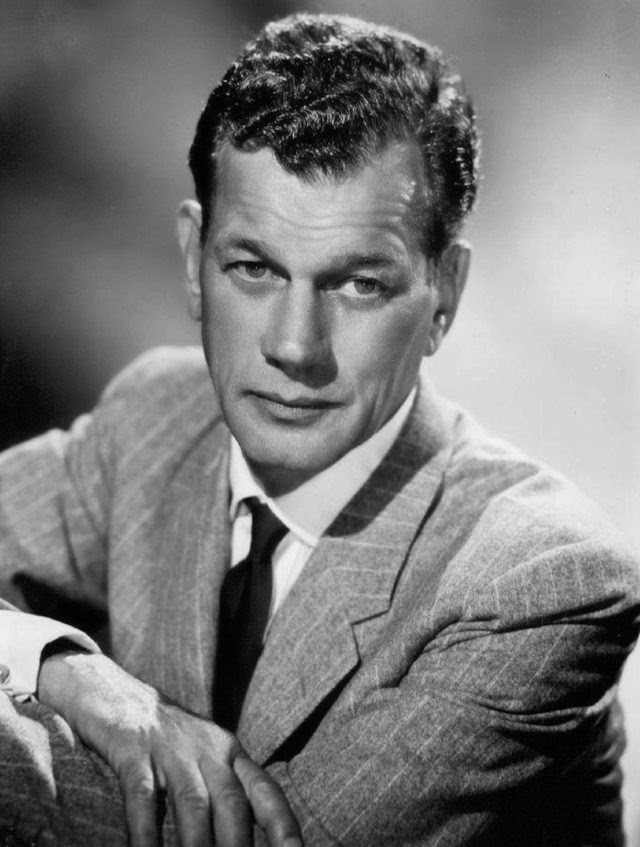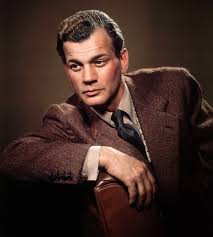Joseph Cotten - Biography
Born May 15, 1905, · Petersburg, Virginia, USA
Died February 6, 1994, · Westwood, Los Angeles, California, USA (pneumonia)
Birth name: Joseph Cheshire Cotten, Jr.
Height 6′ 2″ (1.88 m)
Mini Bio
In 1924, he tried to enter the acting profession in New York City.
His earning opportunities were limited to shipping clerk, and after a year of attempting stage work, he left with friends for Miami. There he found a variety of jobs: lifeguard, salesman, and more significantly, the drama critic for the Miami Herald.
That job evidently led to an appearance in plays at the Miami Civic Theater.
Through a connection at the Miami Herald, he landed an assistant stage manager job in New York.
In 1929 he was engaged for a season at the Copley Theatre in Boston and was able to appear in 30 plays in a variety of parts.
By 1930 he made his Broadway debut.
In 1931 Cotten married Lenore LaMont (usually known as Kipp), a pianist, divorced with a four-year-old daughter.
To augment his income as an actor in the mid-30s, Cotten took on radio shows in addition to his theatre work.
He met an ambitious, budding actor/writer/director/producer with a mission to make his name-Orson Welles.
Cotten was 10 years his senior, but the two found a kindred spirit in one another.
For Cotten, Welles association would completely redirect his serious acting life.
Their early co-acting attempts boded ill for employment in formal acting vehicles.
At a rehearsal for CBS radio, the two destroyed a scene taking place on a rubber tree plantation.
One or the other was supposed to say the line: "Barrels and barrels of pith...."
They could not overcome uncontrolled laughter at each attempt.
The director berated them as 'unprofessional', and thereafter both were considered unreliable.
Welles's ambition put that quickly behind them when he formed The Mercury Theatre Players.
Coming on board were later Hollywood stalwarts: Everett Sloane, Agnes Moorehead, Ruth Warrick, and Ray Collins.
In 1937, Cotten starred in Welles's Mercury productions of "Julius Caesar" and "Shoemaker's Holiday."
He made his film debut in the Welles-directed short Too Much Johnson (1938), a comedy based on William Gillette's 1890 play. The short was occasionally screened before or after Mercury productions, but never received an official release.
Cotten returned to Broadway in 1939, starring as C.K. Dexter Haven in Philip Barry's "The Philadelphia Story".
The uproar over Welles's "War of the Worlds" radio broadcast, was rewarded with an impressive contract from RKO Pictures. The two-picture deal promised full creative control for the young director, and Welles brought his Mercury players on board in feature roles in what he chose to bring to the screen. But after a year, nothing had germinated until Welles met with writer Herman J. Mankiewicz, resulting in the Citizen Kane (1941) idea - in early 1940.
The story of a slightly veiled William Randolph Hearst with Welles as Kane and Cotten, as his college friend turned confidant and theater critic, Jed Leland, would become film history, but at the time it caused little more than a ripple.
Hearst owned the majority of the country's press outlets and so forbade advertisements for the film.
The film was nominated for nine Academy Awards in 1942 but was largely ignored by the Academy, only winning Best Screenplay for Welles and Mankiewicz.
The following year Cotten and Welles collaborated again in The Magnificent Ambersons (1942), acclaimed but again ignored at Oscar time, and the next year's Nazi thriller Journey Into Fear (1943). Cotten, along with some of Welles's ideas, wrote the screenplay. Welles with his notorious overrunning of budgeting was duly dropped by RKO thereafter.
Later in 1943 Cotten's exposure and acquaintance with young producer David O. Selznick resulted in a movie contract and the launching of his mainstream and very successful movie career as a romantic leading man.
Thereafter he appeared with some of the leading Hollywood leading ladies - a favorite being Jennifer Jones, Selznick's wife with the two of them being his most intimate friends.
Cotten got the opportunity to play a good range of roles through the 1940s - the darkest being the blue-beard-like killer in Alfred Hitchcock's thriller Shadow of a Doubt (1943) with Teresa Wright.
Perhaps the most fun was The Farmer's Daughter (1947) with a vivacious Loretta Young.
Cotten starred with Jennifer Jones in four films: the wartime domestic drama Since You Went Away (1944), the romantic drama Love Letters (1945), the western Duel in the Sun (1946), and later in the critically acclaimed Portrait of Jennie (1948), from the haunting Robert Nathan book.
Cotten is thoroughly convincing as a second-rate, unmotivated artist who finds inspiration from a chance acquaintance budding into love with an incarnation of a girl who died years before.
Welles and Cotten did not work again until The Third Man (1949), directed by Carol Reed.
For Cotten, the role as the hapless boyhood friend and second-rate novel writer Holly Martins would be a defining moment in a part both comedic and bittersweet, its range making it one of his best performances.
Unfortunately, he was again overlooked for an Oscar.
Cotten was kept in relative demand into his mature acting years. Into the 1950s, he reunited with "Shadow Of A Doubt" co-star Theresa Wright, to do the memorable bank caper "The Steel Trap"(1952).
He co-starred with Jean Peters in "Blueprint For A Murder"(1953).
For the most part, the movie roles were becoming more B than A.
He had a brief role as a member of the Roman Senate, reuniting with lifelong friend Welles in his Othello (1951).
There were a few film-noir outings along with the usual fare of the older actor with fewer roles.
However, he was much more successful in returning to theater roles in the new television playhouse format.
He also did some episodic TV and some series ventures, such as On Trial, which was later called The Joseph Cotten Show.
He had a memorable role in an Alfred Hitchcock Presents, "Breakdown", where he was a man in a lone and isolated car accident, trapped and unable to speak. He voices over and shows his great acting skill simply through facial expressions.
His one last stint with Welles was uncredited and sort of Jed Leland-revisited as the hokey coroner early in Welles's over-the-top Touch of Evil (1958).
Of his association with Welles, Cotten said: "Exasperating, yes. Sometimes eruptive, unreasonable, ferocious, yes.
Eloquent, penetrating, exciting, and always - never failingly even at the sacrifice of accuracy and at times his own vanity - witty. Never, never, never dull."
With the passing of his first wife in 1960 Cotten met and married British actress Patricia Medina.
The 1960s found him equally busy in TV and film.
He made the circuit of the most popular detective and cowboy series of the period.
By 1964 he returned to film the old-Hollywood-dame- horror-movie genre hit Hush...Hush, Sweet Charlotte (1964) with other vintage Hollywood legends Bette Davis, Olivia de Havilland, and Agnes Moorehead.
His other films of that decade were of the quick entertainment variety along with some foreign productions, and TV movies. There were also more TV series and guest appearances, especially The Ed Sullivan Show, a popular stop during its long run.
In the 1970s Cotten was still in demand-for even more of the curiosity-appeal of the populace for an older star.
Along with the new assortment of TV series, he anchored himself at Universal with small parts in forgettable movies, the sluggish Universal epic dud Tora! Tora! Tora! for instance, and the steady diet of TV series being cranked out there.
Though older actors have laughed in public about their descent into cheap horror movies, one can only wonder at the impetus to do them -- by such greats, as Claude Rains -- besides a can't-pass-up an alluring salary.
Cotten did the campy The Abominable Dr. Phibes (1971) with Vincent Price and two second-rate Italian horror outings
where he was Baron Blood and Baron Frankenstein.
Then again there was better exposure in the Universal minor sci-fi classic Soylent Green (1973). And in yet another Universal sequel, where the profit logic was to gather a cast of veterans from the Hollywood spectrum in any situation spelling disaster and watch the ticket sales skyrocket, Cotten joined the all-star cast of Airport '77 (1977).
He rounded out the decade with the ever-faddish Fantasy Island and more Universal TV rounds.
This contributor met and worked with Joseph Cotten during this latter evolution of one of Hollywood's greats.
He wore his own double-breasted blue blazer and tan slacks in several roles - no need for a wardrobe.
He loved his blue 1939 Jaguar SS, something of a fixture on the Universal lot.
Cotten was not ready to turn his back on Hollywood until the beginning of the 1980s when he managed to appear in the epic flop Heaven's Gate (1980). After a Love Boat episode (1981), Cotten joined his wife and his love of gardening and entertaining friends in retirement. He also had the time to write an engaging autobiography, Vanity Will Get You Somewhere (1987). Cotten's somewhat matter-of-fact and seemingly gruff acting voice served him well.
Certainly, his command of varied roles deserved more than the snub of never being nominated for an Academy Award.
He was not the only actor to suffer being underrated, but that is largely forgotten in those memorable roles that speak for him. And for what it is worth, the Europeans had the very good sense to award him the Venice Film Festival Award for Best Actor for Portrait of Jennie, one of his favorite roles.
As a youngster, while struggling to be an actor he sold paint and advertising space and wrote occasional drama reviews for the Miami Herald until 1930 when he was engaged as an understudy and assistant stage manager and soon after he began appearing on Broadway. In 1937 he joined Orson Welles Mercury Theatre leaving 2 years later to play the lead opposite Katherine Hepburn on Broadway in the hit play The Philadelphia Story, In 1941 Orson Welles took him to Hollywood to play leading parts in Welles' first three feature productions - Citizen Kane, The Magnificent Ambersons and Journey into Fear
Family
Spouses Patricia Medina(October 20, 1960 - February 6, 1994) (his death)
Lenore Kipp(October 18, 1931 - January 7, 1960) (her death)
Trademark
Wavy hair, tall frame, cleft chin.
Distinctive, almost raspy, deep voice.
Often worked with Orson Welles.
Trivia
Served as best man at Orson Welles's wedding to Rita Hayworth.
Despite their mercurial relationship, he and Orson Welles remained friends until Welles' death.
Worked with Alfred Hitchcock in one of his finest films, Shadow of a Doubt (1943).
They worked again in Under Capricorn (1949) but the film flopped with Hitch disowning it.
Cotton never appeared in any subsequent Hitchcock films but did appear in some episodes of Hitchcock's TV series,
including one of the few episodes to be directed by Hitchcock himself.
Before his celebrated appearance as Charles Foster Kane's best friend, Jed Leland, in Citizen Kane (1941), he appears as one of the reporters in the March of Time parody sequence early in the film.
He is seated in the back of the projection room, in the last row at the far left, and is only clearly visible in one shot, but his voice along with that of Everett Sloane (who plays Bernstein) can often be heard in the darkness on the soundtrack.
Retired from acting in the early 1980s after a stroke and a laryngectomy.
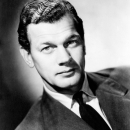
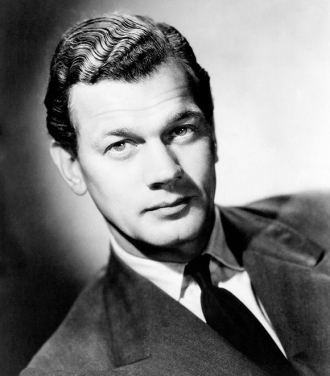
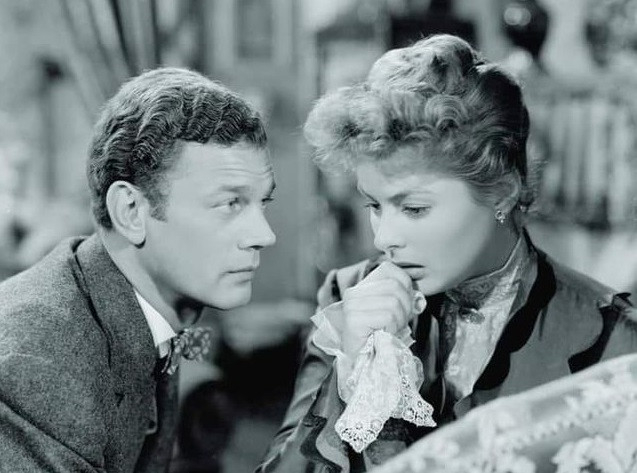
 Amanda S. Stevenson
Amanda S. Stevenson 